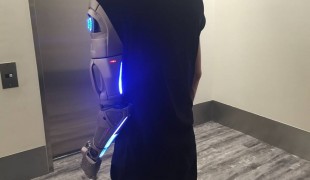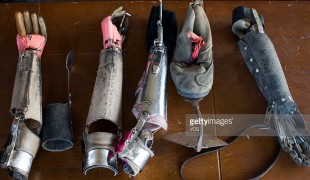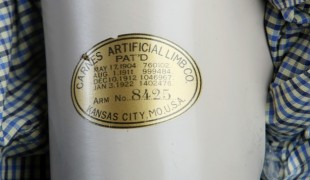- 5999
- 400
- 1
- 1
- 0
- Help Ukraine
About the solution
“There was this thing that hit me and I thought why not try to solve the social problems these children were having since I was part of the GISU robotics club. As we know robotics are playing a great role in our current day to day life. That's when I started working on solving their problems”, the student explained.
The arm can be used by people with physical disabilities and works by executing voice commands such as “open grip”, “raise shoulder”, etc, which allow the user to do things such as lifting a cup and food, and grab stuff.
Using the afterschool time, Alor started by using lego materials to create the structure of the human arm, and then switched to stronger materials.
“With the help of my Robotics teacher I found a computer program that links your VJOY to your microphone so instead of using a joystick you would just speak and the commands are run and all these are linked back with RobotC (this is what I use to programme my robot - PS it uses an NXT brick). So using these three programs I coded my commands that are to be set and run with in the nxt brick the robot arm was able to be functioned by just speaking whereby. You do not need your hands to do anything but just control every movement of the arm by just saying any given coded commands i.e Raise arm, Lower arm”, the inventor expressed.
Alor’s only goal is to help disabled people have a better life. “It will help to replace their hand that they have lost. They will be able to do thing with the arm like they are using their normal hand.
More info: http://bit.ly/2ggZZbh
Adapted from: http://bit.ly/2frgQaa
Post and comment the solutions on Patient Innovation!
https://youtu.be/Z7EITKwqpjE
This solution shall not include mention to the use of drugs, chemicals or biologicals (including food); invasive devices; offensive, commercial or inherently dangerous content. This solution was not medically validated. Proceed with caution! If you have any doubts, please consult with a health professional.
DISCLAIMER: This story was written by someone who is not the author of the solution, therefore please be advised that, although it was written with the utmost respect for the innovation and the innovator, there can be some incorrect statements. If you find any errors please contact the patient Innovation team via info@patient-innovation.com
-
-
453
-
0
-
8660

Advanced prosthetic arm
Grip
(SELF)-CARE: EATING: Eating independently.
(SELF)-CARE: DRINKING: Drinking independently.
Limb Amputation
Prosthesis
Assistive Daily Life Device (to help ADL)
Muscle weakness
Limited range of motion
Reduced grip force (grip)
Restoring mobility
Replacing lost limbs
Promoting inclusivity and social integration
Orthopedics
United Kingdom
-
-
-
199
-
0
-
2578

Disabled man creates prosthetic hands for himself
(SELF)-CARE: EATING: Eating independently.
(SELF)-CARE: DRINKING: Drinking independently.
Limb Amputation
Prosthesis
Assistive Daily Life Device (to help ADL)
Muscle weakness
Limited range of motion
Reduced grip force (grip)
Loss of muscle coordination
Restoring mobility
Replacing lost limbs
Promoting self-management
Orthopedics
China
-
-
-
181
-
0
-
2596

Amputee creates prosthetic arm for himself
(SELF)-CARE: EATING: Eating independently.
(SELF)-CARE: DRINKING: Drinking independently.
Grip
Limb Amputation
Prosthesis
Assistive Daily Life Device (to help ADL)
Muscle weakness
Limited range of motion
Reduced grip force (grip)
Loss of muscle coordination
Restoring mobility
Replacing lost limbs
Promoting self-management
Orthopedics
Australia
-
 en
en